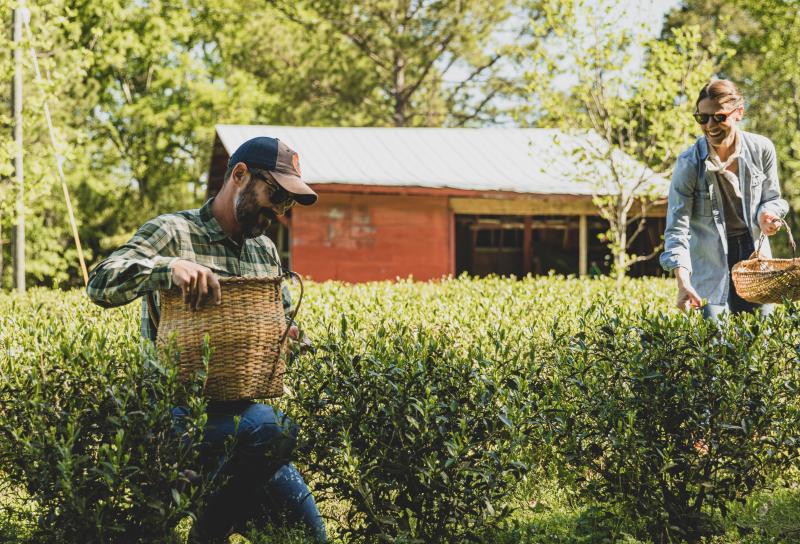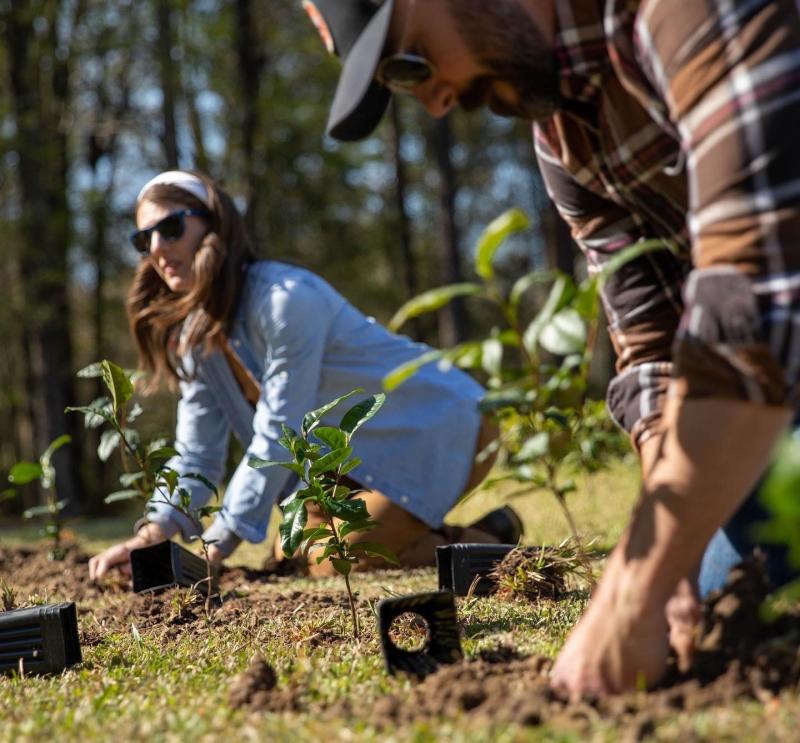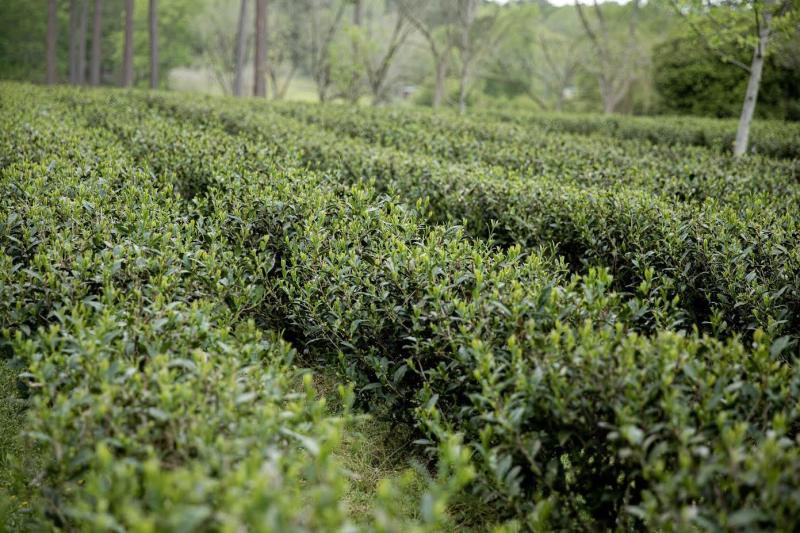When thinking about tea, the last thing that may come to many consumers’ minds is Mississippi. Yet, in Laurel, Miss. – just a mere 90-miles south of Jackson, the state capital – is where you can find Thomas and Hillary Steinwinder, two Mississippi natives who grow and produce tea at Longleaf Tea Co.
While Mississippi-grown tea is not new, the "overnight" success of this new tea producer certainly is. Last year, Longleaf Tea launched its first line of teas and, shortly thereafter, they completely sold out. To add to their surprising and staggering success, this year, they sold out of their second production of teas in a record-breaking time – in only 10 minutes!
The renovation of Longleaf Tea Co.’s farmhouse was even featured nationally on HGTV, fueling more attention and bringing more excitement to the company and the idea of U.S.-grown tea.

“We started officially in 2018, when we started the LLC and when we planted the first 1,200 plants. We had been working on it for seven years before that,” Thomas explained, as he recalled the time they spent studying and learning about cultivating tea. “I wish there was some cool story to tell you about the origination, but it’s really just me and my wife.”
Thomas and Hillary do everything at Longleaf Tea Co. – from plating, weeding and producing the tea itself, and every other step up to bring their teas to customers’ cups.
For Thomas, tea isn’t something that’s new to him; he’s grown up with it all his life. In fact, his father and grandfather ran an import/export business, and his grandfather would bring back suitcases full of tea from China.
He recalled that some of his earliest memories entail drinking tea with his grandfather. They drank teas such as Long Jing and Jasmine Tea. Yet, after drifting away from tea, it wouldn’t be until Thomas was an adult before he re-immersed himself into tea culture when his job relocated him to China in 2010. There, between meetings, he’d go down to the local tea shop and practice Mandarin while revisiting some of his old tea favorites. And it was at this tea shop where the owner of the shop asked him one important question: “Where does the United States grow its tea?”
Little did Thomas know, this question would plant the seed of an idea that he wouldn’t be able to shake – an idea that would later turn into the tea company that he and his wife manage today.
Navigating the Hurdles of Growing Tea in the United States
Growing tea on a wide scale isn’t an investment that many U.S. banks are ready to jump on. While obtaining bank loans to launch a business that’s heavily reliant on agriculture is a struggle, it’s especially impossible to do when the output of the crop can take years to yield results (for reference, the Camellia sinensis plant takes at least three years before yielding harvestable tea). However, Thomas explained how they navigated around that hurdle.
“We planned out a growth-model that was based on how many plants we planted in the ground… We managed to meet a budget with our personal savings. You go to a banker and try and say I’m going to put 1,000 plants in the ground and count it as a securable asset in the US, they would laugh you out of the room,” said Thomas.
Indeed, starting a company based on agriculture that takes years to produce a crop isn’t the first hurdle they faced when starting. They operated the business on a trial-and-error basis, and only continued moving along when they were able to meet new goal after new goal.

“All of 2018-2019 was just growing the plants and making sure we could keep them alive,” Thomas explained. "In 2020, it was an entire year of [producing] batch after batch of trial-and-error making tea.”
Thomas noted that everything they accomplished wouldn’t be possible without the support of many others, including The Great Mississippi Tea Company, in Brookhaven, Miss.
“By the end of 2020, after a ton of terrible batches of tea, we can actually make a decent cup of tea,” shared Thomas. And after refining their production of green, black and white tea, they went commercial and sold their first batch in 2021.
While being humble about the success of the launch of their first product line-up, they didn’t quite predict that their small project would be met with overnight popularity. After years of planning, studying and learning, all of their hard work finally started to pay off. Even so, after experiencing success from years of dedication and hard work, the two tea entrepreneurs also faced an issue they didn’t expect.
“We can’t meet demand at all right now,” Thomas explained. “Everyone says it’s a great problem to have, and we’d like to have more tea to provide to people, so we’re having to expand as fast as we can. But as you probably already know, it takes three years to grow a plant before it’s really ready to start being harvested.”

Longleaf Tea Co. realizes that they can only do so much for the time being, but they’ve already undertaken plans to expand. And while you can’t rush the speed at which a plant grows, they’ve begun planning to learn new processing techniques so they can expand their catalog moving forward.
HGTV x Longleaf Tea Co.
When talking to Thomas about the experience of Longleaf Tea and their farmhouse being featured on HGTV, he said, “It’s incredibly cringy; I don't like to hear my voice. I was hoping they would cut out the parts where I dance. I have a happy dance and it comes out sometimes without me being ready for it. Some of the things they surprised us with brought out my happy dance. Seeing my happy dance on TV was embarrassing! But, overall, it was really fun.”
He added: “On the five-acres that we lease, there’s a farmhouse that’s been in my wife's family for six generations. There’s a lot of history, but it needed a lot of work. We didn’t have the capacity to do so, on top of our other jobs, along with processing and making tea. After talking to Erin and Ben Napier, the hosts of Home Town [on HGTV], we decided to trust them with taking on this project.”
Thomas said HGTV has brought an increase in interest in having people visit and tour the farm in person. “It all makes me wish we planted a lot more plants in the ground in 2018!”
While the future of Longleaf Tea looks bright, Thomas and Hillary said they’re eager to take on any challenges they might face, while encouraging a new appreciation for the culture of tea and honoring the heritage from which tea originates.
They’re also excited to continue spreading their love and appreciation of tea and tea culture to those in their local and global community. And despite being so new and so successful in their journey thus far, they’re delighted to see where they can take Longleaf Tea Co. next.
To learn more about Longleaf Tea Co., visit LongleafTea.co.
World Tea News contributor Cody Wade, also known by his blog name, "The Oolong Drunk," has been tea blogger and tea educator for seven years. His passion for tea started with oolongs, but he has grown to appreciate every aspect of the tea industry. He's also given lectures and presented at the Houston Tea Festival, the Mid-West Tea Festival and the World Tea Conference + Expo, and he notes that he's enthusiastic with his passion for tea education and bringing people together to make the community stronger.
Plan to Attend or Participate in the
World Tea Conference + Expo, March 27-29, 2023
To learn about other key developments, trends, issues, hot topics and products within the global tea community, plan to attend the World Tea Conference + Expo, March 27-29, 2023 in Las Vegas, co-located with Bar & Restaurant Expo. Visit WorldTeaExpo.com.
To book your sponsorship or exhibit space at the World Tea Conference + Expo, or to enquire about advertising and sponsorship opportunities at World Tea News, contact:
Ellainy Karaboitis-Christopoulos
Business Development Manager, Questex
Phone: +1-212-895-8493
Email: [email protected]
Also, be sure to stay connected with the World Tea Conference + Expo on social media for details and insights about the event. Follow us on Twitter, Facebook, Instagram and LinkedIn.
